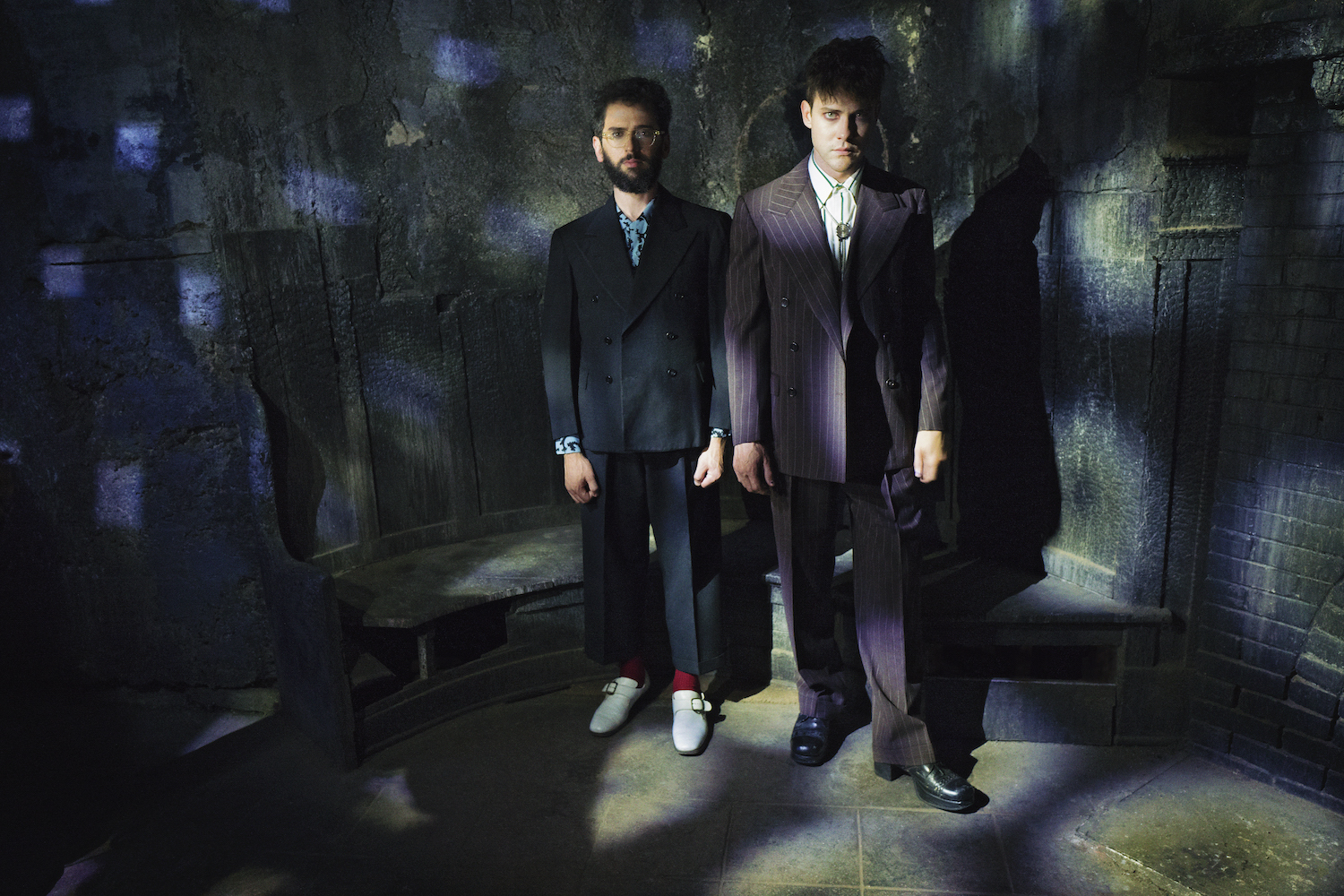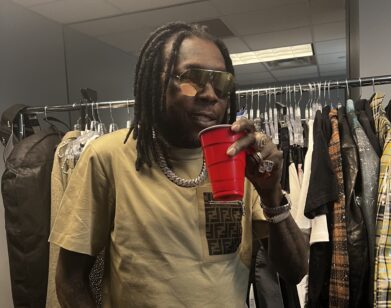This is how MGMT spent the last decade
To say that a lot has changed since the release of MGMT’s 2007 debut album Oracular Spectacular would be an understatement. In the last 10 years, the band—made up of Andrew VanWyngarden and Ben Goldwasser—has gone from heady disco hit machine to full-blown outsider psychedelic project, and the festival-friendly synth rock scene they spearheaded with tracks like “Kids” and “Electric Feel” has all but disappeared from the world of indie rock.
Now, following two ambitiously peculiar albums (2010’s Congratulations and 2013’s MGMT) and a lengthy self-imposed break, VanWyngarden and Goldwasser have returned with Little Dark Age. From the outset, the record is easily the duo’s most commercial sounding creation in years. But it’s also a return to form in a truer sense. VanWyngarden and Goldwasser have reverted to their faster, more instinctual songwriting roots, and come away with something that feels both personal and painfully indicative of the world in which it was created.
Little Dark Age was named for the hurricane of current events that swirled around its making. The band was about halfway through the record when the 2016 presidential election took place, Goldwasser recalls, en route to producer Dave Fridmann’s studios in Buffalo, New York: “Up until that point we had our own self-imposed rules for how much a song should be about a specific thing. When the election happened it was like, here’s this very real thing that has a direct impact on us and a lot of people. It sort of eliminated the question of what we were writing about.”
That session at Fridmann’s, Goldwasser remembers, was a struggle. “We had gone in hoping to finish four songs and we only got two done. We left that session feeling really frustrated and really bummed out on how we’d perceived things had gone.”
Though they didn’t know it at the time, those sessions yielded two of Little Dark Age’s most vital tracks. The first, “One Thing Left To Try,” is a pulsating ‘80s-style anthem about overcoming suicidal thoughts. The other, “Hand It Over,” is an airy—and at times eerie—soft rocker that manages to be about the state of the nation and the state of the music industry all at once. “The deals we made to shake things up / And the rights that they abuse / Might just fuck us over,” the song opens. “But the doors won’t shut / Until they’re sure there’s nothing left to lose / Someone’s taking over … It’s time to hand it over.”
If this sounds like peculiar fodder for a catchy-as-hell synth record, you wouldn’t be wrong. But in an age where dance music seems to be the only leg that legacy indie bands have left to stand on (see: Franz Ferdinand, Arcade Fire, Phoenix), MGMT are doing an especially fine job of juxtaposing infectious melodies with dark, biting subject matter. Take, for example, album opener “She Works Out Too Much,” a bopping acid trip of synthesizers and vocoder that’s all about the exhausting world of dating apps. There’s also “TSLAMP,” or “Time Spent Looking At My Phone,” a woozy, dub-inspired jam about the discontent that comes from being tied to your smartphone.
But this kind of social critique is also nothing new for MGMT. Though many relate the band to the shirtless neo-hippie aesthetic they donned early on in their career, the reality is that MGMT’s music has always felt more paranoid Millennial than wide-eyed love child. Never forget that their 2007 debut opened with “Time To Pretend,” an acid-tongued anthem about fame that included the line, “Let’s make some music make some money find some models for wives.” In 2010, they went down a heavy psych rock path on Congratulations, which included lyrics that urged the masses to “Sue the spiders / Sink the Welsh / Stab your Facebook / Sell, sell, sell.” By 2013, MGMT’s dark streak was yielding song titles like “Your Life is a Lie.”
“In a lot of ways, [MGMT] was the reaction to having to take an academic view of music,” recalls Goldwasser of the band’s early days. The duo first met as students at Wesleyan University, where they both enrolled in the school’s famously avant-garde music program and studied under experimental sound artists like Alvin Lucier. “Studying music like that, it was important to have an extracurricular thing, and for us that was playing synthesizers and trying to make them sound like animals.”
That reactionary approach to their avant-garde surroundings manifested itself in MGMT’s first EP, 2005’s Time to Pretend. Following its release, the band was invited to open a tour with Of Montreal. By the time Goldwasser and VanWyngarden returned home to finish school, Time to Pretend had landed in the hands of Columbia Records, who signed the band to a four-album deal and paired them up with producer Dave Fridmann (Flaming Lips, Mercury Rev) to make 2007’s Oracular Spectacular. As the story goes, the record produced a steady stream of inescapable radio hits (“Kids,” “Time to Pretend,” Electric Feel”), and made MGMT one of the more fantastic indie rock breakthrough tales of the early aughts.
The band toured for two years in support of Oracular. When it came time to record it’s follow-up, Goldwasser and VanWyngarden decamped to Southern California. The result was 2010’s Congratulations, a dizzying, guitar-based collection of songs that revolved mostly around fame and dark inner workings of the music industry. Though critically lauded, the album’s headier approach resulted in mixed reviews amongst fans. For their 2013 self-titled release, the duo pushed even further into the psych rock fringes, favoring improvisation and indulgence over any sort of easily recognizable choruses and hooks. Following a “troubled” album release, MGMT hit the road for another year and a half. When they returned home, neither were sure what the future held. “At the end of 2014 I felt good about the band, but I was unsure where it was going to go next or where we fit in,” VanWyngarden remembers. “At the end of that tour I thought, ‘Who knows? Maybe this is the last hurrah.’”
In the weeks that followed, Goldwasser and VanWyngarden started to realize that things needed to change. “I was really exhausted and not happy,” says Goldwasser. “I felt like we’d finally gotten to a point where we were sounding good, but I wasn’t happy in New York and I wanted to get out. I needed to hit the reset button and focus on being happier in my life general.” In order to accomplish this, for the first time in nearly a decade, MGMT took a break. Goldwasser picked up and moved to Los Angeles with his girlfriend. VanWyngarden settled into his home in Rockaway Beach, New York, and both spent about a year focused on everything but the band. Then, around the summer of 2016, the two started trading ideas via email, scheduling working sessions whenever they felt like they were getting to a good place.
“The long-distance collaboration ultimately helped us to focus,” says VanWyngarden. “When we were both in New York it was distracting—it was too easy to get together, so when we would we wouldn’t get anything done. Instead of working we’d just go get coffee. Being far away from each other and really having to make the time, it put a little bit of pressure on really being in the moment.”
The duo also opened their writing process up to others for the first time, beginning with Chairlift’s Patrick Wimblerly, who shares a producing credit with Fridmann. “It was Patrick and that element of collaboration and working with different friends and artists that really set the tone for the album in a good way,” recalls Goldwasser. Fellow cosmic likeminds Ariel Pink and Connan Mockasin also came into the fold to help with guitar and vocal parts. “Having someone like Ariel come over and show us that it was possible to do something spontaneous and off the cuff and still have it be meaningful was really inspiring for us, and necessary,” says Goldwasser. “Up until that point we were still trying to craft songs the way we did on the third record, through improvisation. I don’t know how we got to that point, because when we started the band in college we wrote real fast and we didn’t really care and it was playful, and then at some point the playfulness wasn’t quite as important. I think we really rediscovered that on this album.”
Listening to Little Dark Age, it’s easy to peg the record as MGMT’s commercial reboot. Following the dense, collage-like arrangements of its predecessor, Little Dark Age feels both tighter and more carefree—something Goldwasser and Wyngarden attribute to a conscious loosening of the reins on their writing process. “I think in the past we had this ‘suffer for art’ mentality where we felt like we had to bury ourselves in the creative process,” says VanWyngarden. “At some point we realized we just had to stop caring so much and stop treating it like it’s the most important thing.”
“I also think it was getting back to just living life as a normal person,” adds Goldwasser. “This was the first time since 2007 when we felt like we could focus on things like family and friends and being social and not living in this weird fantasy bubble where you don’t feel connected to people, and we really needed to do that.”
Perhaps that’s why the songs on Little Dark Age feel like the most relatable ones of MGMT’s career. On Oracular Spectacular, VanWyngarden proved himself to be capable of navel-gazing with a caustic humor. After that, though, things became increasingly bleak and obtuse, which didn’t help the knotty arrangements on both MGMT and Congratulations. With Little Dark Age, though, VanWyngarden beautifully bridges the gap. He’s writing bracingly and brutally about fear and technology in a way that feels both personal and big picture. “Welcome to the shitshow / Grab a comfortable seat,” he deadpans on “She Works Out Too Much.” Later, “When Your Small” finds him distilling depression down to its essence: “When you’re low / You reach a certain point / Where you can’t really see the point.”
“It’s not pessimistic or cynical, it’s really not trying to be,” Goldwasser says of Little Dark Age, “Even if some of the lyrics are coming from a darker place of death or despair or concerns about modern technology, we still wanted [the record] overall to be playful and hopeful. We want it to connect with people and make get them to question what’s happening around them.”
In that way, Little Dark Age may be the ideal soundtrack for a post-Trump world: conscious, wary, and joyous in spite of all the darkness. “If we lose our touch, it won’t mean much / If everyone’s confused,” VanWyngarden sings on the album’s gauzy closer, “Hand It Over.” Like many of MGMT’s best moments, it’s a song that teeters between sonic optimism and lyrical pessimism. The fact that it comes away sounding like a reassurance, though, is what makes this feel like MGMT is chipping away at the doom and gloom to usher in an age that’s a little less dark.
MGMT’S NEW RECORD LITTLE DARK AGE (COLUMBIA RECORDS) IS AVAILABLE NOW.







